|
|
|
Sort Order |
|
|
|
Items / Page
|
|
|
|
|
|
|
| Srl | Item |
| 1 |
ID:
159970
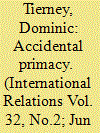

|
|
|
|
|
| Summary/Abstract |
Why did states fail to balance against the United States after the end of the Cold War? Scholars have neglected an important dynamic: the accidental nature of America’s rise to primacy. The United States became the sole superpower not by deliberately increasing its capabilities but due to the unexpected collapse of its rival, the USSR. The case illustrates that a state’s responsibility for its gains in power can vary significantly, with important consequences for subsequent balancing. Active or deliberate power increases tend to produce more balancing than passive power increases because they signal aggressive intentions, alter the dyadic power balance between the rising state and potential balancers, and trigger loss aversion.
|
|
|
|
|
|
|
|
|
|
|
|
|
|
|
|
| 2 |
ID:
159973
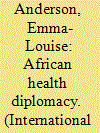

|
|
|
|
|
| Summary/Abstract |
Health crises pose fundamental challenges to international relations and have been a major focal point of contests for global influence, particularly in the global South, where such crises are most acute. This necessitates a focus on the arenas of global health diplomacy and the power struggles that emanate from them, including the often-overlooked agency of African actors within these arenas. Drawing upon a total of 3 months of fieldwork in 2007 and 2014 that included 68 key-informant interviews, participant observations, and informal discussions, this article interrogates the mechanics of multi-stakeholder health diplomacy in Malawi, where a near-permanent state of health crisis and underdevelopment has generated extreme dependency on external health assistance. This article conceptualises shadow diplomacy as the informal networks and channels of influence that run parallel to, but are not recognised as part of, formal diplomacy. This concept reveals how health is key to struggles for leverage by both international and local actors, giving rise to informal and subversive manifestations of diplomacy in the ‘shadows’. It enables us to understand not only how Western powers consolidate and obscure their enduring power but also how the ‘shadows’ benefit African political elites as they leverage their dependency to subvert global power structures for their own ends. It disrupts the external/internal binary of international donors/African states and reveals that these are not monolithic actors but instead comprising complex individuals with multi-faceted motivations and divided loyalties.
|
|
|
|
|
|
|
|
|
|
|
|
|
|
|
|
| 3 |
ID:
159971
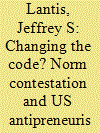

|
|
|
|
|
| Summary/Abstract |
Cyberspace appears to offer limitless possibilities for collaboration and economic opportunity in the twenty-first century, but cyber-attacks, breaches of privacy, and security threats also have become commonplace. In the face of these challenges, a number of governments have been locked in debates over the future of cyberspace governance, including the Russian Republic, the People’s Republic of China, and the United States. This study examines the ongoing contestation of the international normative architecture for cyberspace, with a focus on the United States’ role as a norm ‘antipreneur’, seeking to defend the status quo multi-stakeholder norm for a more open Internet from entrepreneurial efforts by Russia and China to establish multilateral governance with ‘cyber-sovereignty’. Drawing on recent advances in constructivist theory, the study explores antipreneurial strategies to contest efforts by entrepreneurs to introduce new norms, as well as implications for norm development and change. Process tracing is employed to examine cyberspace governance debates. The study concludes by discussing prospects for an International Code of Conduct for Cyberspace, as well as theoretical and political implications of antipreneurship in modern norm contestations.
|
|
|
|
|
|
|
|
|
|
|
|
|
|
|
|
| 4 |
ID:
159972
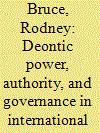

|
|
|
|
|
| Summary/Abstract |
Barnett and Duvall have offered a highly useful constructivist taxonomy of power in response to the rationalist question of why constructivists formerly lacked a theory of power. However, in applying their taxonomy of power to the question of global governance, they draw upon a specific interpretation of their ‘structural’ form of power from the radical theory of Steven Lukes. This move generates a number of ontological and analytic issues that constructivists normally avoid. This article offers three amendments to Barnett and Duvall’s thesis. These involve the (1) recognition and use of the subsumption of the constitutive forms of power that they theorize within the concept of ‘deontic power’, introduced in the institutional philosophy of John Searle and (2) recognition that the posited distinction between subjective and objective interests returns us to a rationalist and materialist ontology that resolves the question of actor interests and motivations through exogenous imputation by the analyst – a retrograde step for constructivist theory that can and should be avoided. (3) In developing the deontic bases of the constitutive forms of power introduced by Barnett and Duvall, we will recover the social means by which power can be exercised as authority.
|
|
|
|
|
|
|
|
|
|
|
|
|
|
|
|
| 5 |
ID:
159974
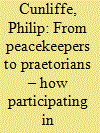

|
|
|
|
|
| Summary/Abstract |
This article provides a heuristic study of three cases where participation in peacekeeping operations prompted military rule in the peacekeeper-contributing state. These three atypical cases contradict the theory of diversionary peace, which claims that contributing to peacekeeping operations abroad should stimulate democracy at home. The experience of these three countries also calls into question the conventional wisdom that strongly associates peacekeeping with liberal democratic institutions, outcomes and practices. Via triangulation across literature, reports, elite interviews and WikiLeaks cables, these cases are examined in order to identify more generalisable observations regarding how participation in peacekeeping may enhance the role of the military at the expense of democratic order and civilian rule in the contributing state. The theory of diversionary peace is shown to suffer from serious conceptual flaws. Some preliminary efforts are made to generalise the findings, with Ghana and Uruguay identified as warranting further investigation. A number of variables are identified as offering scope for generalisation, namely, revenue, leadership and military size. Several promising areas for further research are also identified: how military dependence on peacekeeping may make political systems more permeable to outside influence, how far the United Nations (UN) can politically influence its contributor states and how peacebuilding may affect peacekeepers’ understanding of their role in their own countries. By examining the feedback effects of peacekeeping on peacekeeper-contributing states, the article reverses the conventional focus of peacekeeping scholarship and contributes to the growing literature examining the wider ramifications and unintended consequences of liberal conflict management.
|
|
|
|
|
|
|
|
|
|
|
|
|
|
|
|
|
|
|
|
|